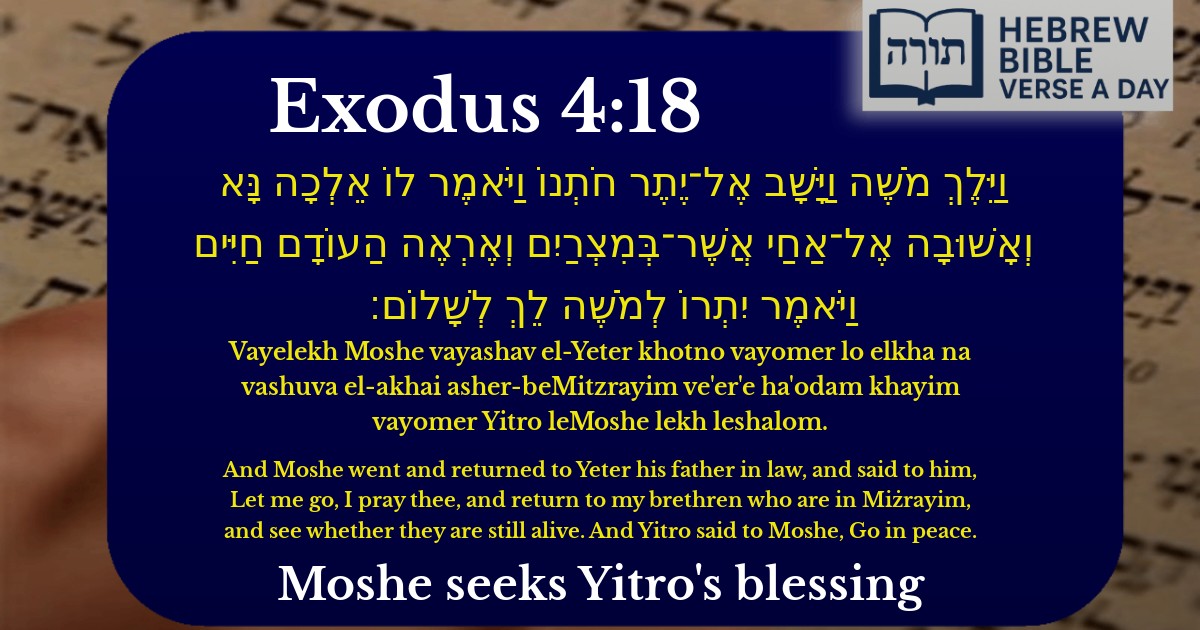Join Our Newsletter To Be Informed When New Videos Are Posted
Join the thousands of fellow Studends who rely on our videos to learn how to read the bible in Hebrew for free!
Hebrew Text
וַיֵּלֶךְ מֹשֶׁה וַיָּשָׁב אֶל־יֶתֶר חֹתְנוֹ וַיֹּאמֶר לוֹ אֵלְכָה נָּא וְאָשׁוּבָה אֶל־אַחַי אֲשֶׁר־בְּמִצְרַיִם וְאֶרְאֶה הַעוֹדָם חַיִּים וַיֹּאמֶר יִתְרוֹ לְמֹשֶׁה לֵךְ לְשָׁלוֹם׃
English Translation
And Moshe went and returned to Yeter his father in law, and said to him, Let me go, I pray thee, and return to my brethren who are in Miżrayim, and see whether they are still alive. And Yitro said to Moshe, Go in peace.
Transliteration
Vayelekh Moshe vayashav el-Yeter khotno vayomer lo elkha na vashuva el-akhai asher-beMitzrayim ve'er'e ha'odam khayim vayomer Yitro leMoshe lekh leshalom.
Hebrew Leining Text
וַיֵּ֨לֶךְ מֹשֶׁ֜ה וַיָּ֣שׇׁב&thinsp
וַיֵּ֨לֶךְ מֹשֶׁ֜ה וַיָּ֣שׇׁב&thinsp
🎵 Listen to leining
Parasha Commentary
📚 Talmud Citations
This verse is not quoted in the Talmud.


Moses' Return to Yitro
The verse states, "וַיֵּלֶךְ מֹשֶׁה וַיָּשָׁב אֶל־יֶתֶר חֹתְנוֹ" ("And Moshe went and returned to Yeter his father-in-law"). Rashi explains that Moses had previously sent his wife Tzipporah and their sons back to Midian while he was fulfilling his mission in Egypt (Shemot 4:20). Now, before returning to Egypt to lead Bnei Yisrael, Moses seeks permission from his father-in-law, demonstrating proper derech eretz (respectful conduct).
Moses' Request to Yitro
Moses says, "אֵלְכָה נָּא וְאָשׁוּבָה אֶל־אַחַי אֲשֶׁר־בְּמִצְרַיִם" ("Let me go, I pray thee, and return to my brethren who are in Egypt"). The Midrash (Shemot Rabbah 4:3) highlights Moses' humility and compassion—he refers to the Israelites as "my brethren," showing his deep connection to them despite his royal upbringing in Pharaoh's palace. The phrase "וְאֶרְאֶה הַעוֹדָם חַיִּים" ("and see whether they are still alive") reflects his concern for their suffering under Egyptian oppression.
Yitro's Response: "Go in Peace"
Yitro replies, "לֵךְ לְשָׁלוֹם" ("Go in peace"). The Talmud (Berachot 64a) teaches that when someone departs with words of peace, they are granted divine protection. Ramban (Nachmanides) adds that Yitro’s blessing was not merely a farewell but a prophetic approval of Moses' mission, recognizing that his return to Egypt was divinely ordained.
Key Lessons from the Verse